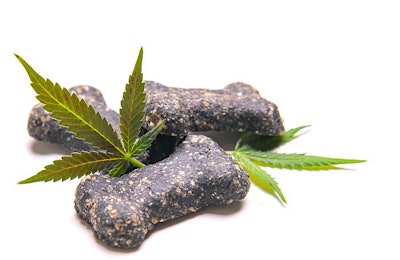
Stop me if you’ve heard this joke before. An agricultural inspector (i.e., state regulator) walks into a pet store, walks by the CBD (cannabidiol) products (which are illegal), walks by the pet food made with crickets and sprouted seeds (unapproved ingredients) and questions a “random” food to see if it is complete and balanced, and properly registered or licensed with the state.
Unfortunately, there is no punch line, and this very incident happens often. That is, regulatory inspectors blatantly ignore illegal and unapproved products that are being sold by distributors and pet retail shops from coast to coast.
If regulators are going into brick-and-mortar stores to look at and target products that are not registered or licensed or to purchase products for guaranteed analysis and microbial testing, then why are they not removing products that are in clear violation of state and federal laws?
CBD, hemp products still not legal or approved
The Food and Drug administration (FDA) continuously updates its page on the regulation of cannabis and cannabis-derived products, including CBD and hemp. The most recent update occurred on January 22, 2021; however, it did not impact anything we already knew about pet foods and treats. In the Questions and Answers section, FDA is extremely specific about the legality of interstate commerce for animal food or feed (which includes treats) containing CBD or hemp. For example:
Answer: No. Under section 301(ll) of the FD&C Act [21 U.S.C. § 331(ll)], it is prohibited to introduce or deliver for introduction into interstate commerce any food (including any animal food or feed) to which has been added a substance which is an active ingredient in a drug product that has been approved under section 505 of the FD&C Act [21 U.S.C. § 355] … FDA has therefore concluded that it is a prohibited act to introduce or deliver for introduction into interstate commerce any food (including any animal food or feed) to which THC or CBD has been added.
24. I’ve seen cannabis products being marketed for pets. Are they safe?
Answer: FDA is aware of some cannabis products being marketed as animal health products. We want to stress that FDA has not approved cannabis for any use in animals, and the agency cannot ensure the safety or effectiveness of these products …
25. Can hemp be added to animal food?
Answer: All ingredients in animal food must be the subject of an approved food additive petition or generally recognized as safe (GRAS) for their intended use in the intended species. If an animal food contains an ingredient that is not the subject of an approved food additive petition or GRAS for its intended use in the intended species, that animal food would be adulterated under section 402(a)(2)(C)(i) of the FD&C Act [21 U.S.C. § 342(a)(2)(C)(i)]. In coordination with state feed control officials, CVM also recognizes ingredients listed in the Official Publication (OP) of the Association of American Feed Control Officials (AAFCO) as being acceptable for use in animal food. At this time, there are no approved food additive petitions or ingredient definitions listed in the AAFCO OP for any substances derived from hemp, and we are unaware of any GRAS conclusions regarding the use of any substances derived from hemp in animal food.
For further clarification, AAFCO also provides Guidelines on Hemp in Animal Food, which states: “As of July 2020, hemp and hemp products may not be used in animal feed or pet food in the U.S. The 2018 Farm Bill did not grant the right to use hemp and hemp products in food for humans or animals.”
Thus, contrary to popular belief, or what some CBD manufacturers would tell you, hemp and hemp-derived products are not approved for usage in animals in foods and treats.
Is there any enforcement of CBD in the pet industry?
In short, no! If you walk into a pet store, you will see a plethora of CBD and hemp products for dogs and cats including treats, chews, peanut butter, honey and balms/gels. In general, these companies tend to utilize the term “CBD” and often known drug claims (i.e., cure, prevent, treat or mitigate) or a disease state (i.e., anxiety, pain, cancer, etc.) on their websites and/or social media. This is a problem, because utilizing drug claims for marketing of CBD products is illegal since CBD would have to be approved by FDA to “cure, prevent, treat or mitigate” such a condition—and it is not.
Many CBD companies have utilized such claims and, surprisingly, some still do. However, given the FDA administering warning letters against companies who make such claims, we have started to see some companies clean up their labels. That said, only a handful have received FDA warning letters. In fact, to date, less than 20 CBD pet product companies have been warned by the FDA. Further, many of the companies warned do not really have a presence in the pet store channel.
For example, Super Snouts Hemp Company offers you a fun, tasty treat to deliver CBD to your best friend in peanut butter (240 mg of water-soluble CBD). Another example: Honest Paws offers soft chews to calm nervous pets, relieve occasional aches and discomfort, and provide great comfort in life with virtually zero side effects (5mg CBD per bone-shaped chew). Yet another example, Charlotte’s Web Calming Chews, contain 2.5mg of plant-based cannabinoids per chew and help with doggie stresses, anxiousness and emotional balance.
These issues are in addition to the fact that hemp products in the marketplace are largely not standardized. For example, a recent study by Cornell University showed 10 of 29 CBD products tested were within 10% of the concentration on the label. That same study also showed that heavy metal contaminants were found in four of 29 products. This means that many CBD companies are not policing themselves, on top of regulatory authorities turning a blind eye. Talk about the Wild West!
Why isn’t there any enforcement?
Great question! The laws and regulations for CBD and hemp for dogs and cats are black and white. Further, with acknowledgement of such laws and regulations by federal, state agencies and AAFCO, it makes you wonder why there is failure to enforce them? It is not like inspectors do not see it when they walk into the store to determine who has properly registered their foods and treats to pay their yearly license/registration or tonnage fees. Or that the information from such companies and manufacturers is not clearly accessible on their computers at home or in the office.
Maybe the lack of enforcement is because the CBD pet space is estimated to be worth US$175–225 million across all channels by 2025? Let’s face it, if CBD had been properly regulated and enforced from the beginning, state and federal agencies would not be in this situation.
Other unapproved ingredients not being enforced
Unfortunately, CBD/hemp is not the only “non-approved’” ingredient in the marketplace that lacks enforcement by state and federal agencies. Despite the state of the industry and general lack of enforcement and accountability, this should not come as a surprise. If they fail to enforce a “drug” from being put into a pet food, how are authorities going to enforce other ingredients that have been in the marketplace for years or are starting to gain traction in the marketplace, like crickets, sprouted grains and seeds, kefir and others?
By the way, none of those ingredients have scientific information to support their benefits, never mind any nutritional adequacy in dogs and cats. What is worse is that we do not even know if such ingredients have detrimental effects. After the canine dilated cardiomyopathy (DCM) debacle, we as an industry should know better.
What will it take for enforcement to happen?
When I am asked, “How are these ingredients in marketplace?” I often respond, “I don’t know. Good question.” I am also often asked, “What will it take for enforcement?” In my opinion, it will likely take animals getting sick or dying. Which is not the right answer!
Unfortunately, this issue gets further amplified because the barrier of entry into the marketplace is at an all-time low, since companies can sell directly to consumers and avoid brick-and-mortar distribution (and product registration) altogether.
We know federal agencies cannot say it is a lack of resources; think of how much time was wasted chasing the hypothesis that DCM was caused by grain-free pet foods—only to find out it that it is a multi-factorial issue with potential variables including, but not limited to, breed, age, weight, gastrointestinal disease, atopy, infection and more. (Which is something we already knew!)



















